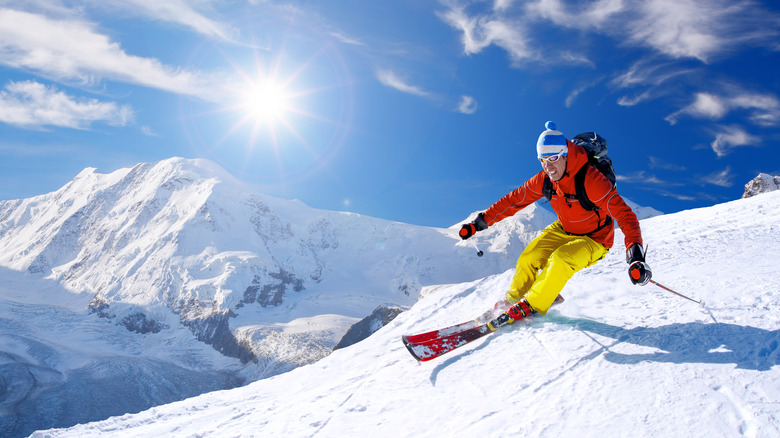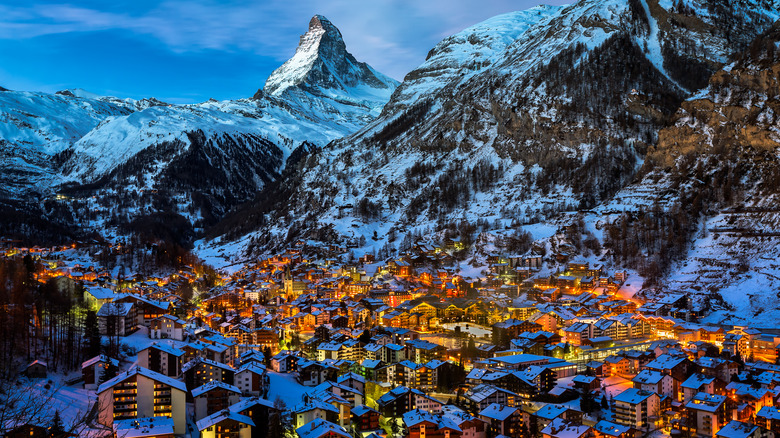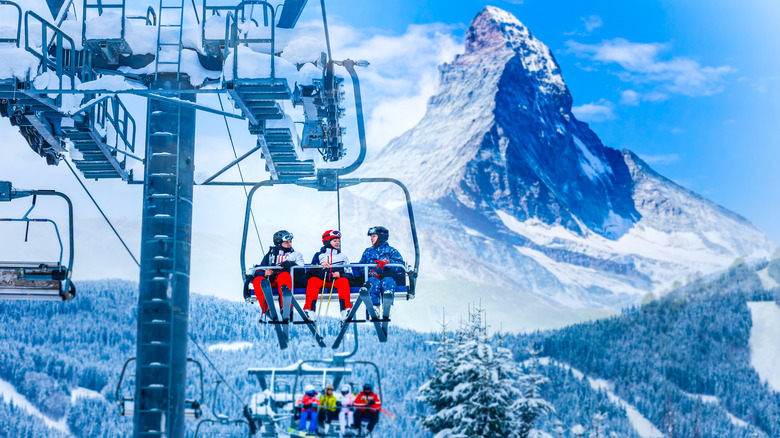Travel Guides Outdoor Adventures
Kristin Conard
When you think of Switzerland, what comes to mind? Could be chocolate — and for good reason; the small country has a number of world-renowned chocolate factories, like Cailler, which has been in operation since 1819, and you can tour their factory and even try your hand at making your own chocolate, says Lost in Switzerland. It could be cheese you think about when it comes to Switzerland; the country makes over 500 varieties of cheese, per The Cheese Professor. Learn more about Switzerland cheese with a tour of La Maison du Gruyère and smell, touch, and taste your way through the life cycle of a cheese starting from the cow.
But top of mind for Switzerland is almost definitely its beautiful alpine scenery — the Matterhorn is the world’s most photographed mountain. The Swiss Alps cover over 50% of Switzerland, according to Alpen Wild. And that makes Switzerland an ideal destination for all kinds of outdoor activities, particularly skiing. So if you’ve already checked out the best of America’s ski resorts, next on your list should be Switzerland, where you can actually ski year-round. But just because you can do it all year doesn’t mean it’s always the best skiing conditions; here’s what you need to know about the best time of year for Swiss skiing.
Start the new year with some of Switzerland’s best snow

Extravagantni/Getty Images
Switzerland has a whopping 356 ski resorts, according to Ski Resort.info. And if you’re looking for the best snow of the year — though with Mother Nature, nothing is a 100% certainty — wait until January and enjoy perfect powder through February, says Touring Switzerland. By mid-January, you can expect plenty of fresh powder at the ski resorts at both high and lower elevations. And by then, the ski resorts should all be open and ready for you to explore.
You can go earlier since the main ski season can start up by mid-November, particularly at higher elevations as the first big snows of the year start, per Weather to Ski. So you may get lucky if you plan a ski trip to Switzerland in November, but remember that even if ski resorts open in November, depending on the snowfall, they may not be open every day of the week. The same goes for the end of the ski season, you may still get great ski conditions throughout Switzerland in late March and into April, but it’s definitely not a guarantee.
The best snow will bring the crowds and push up room rates

Anshar73/Getty Images
Some things to keep in mind, though. January is the coldest month of the year with an average temperature of 35 degrees Fahrenheit, via Book Mundi. So make sure you pack smart with plenty of warm layers. It’s also a particularly pricey time of year. As all the powder hounds flock to the slopes, room rates will go up. And the snow that makes skiing so magical in Switzerland also lends itself to the picturesque beauty of many mountain towns. Pair that with the popular Christmas markets that pop-up around Switzerland at the holidays, and the Swiss Alps become a picture-perfect holiday destination — which means ski resorts will be pricey and potentially crowded.
If skiing is an absolute must on your Switzerland vacation, and you can’t make it during the main ski season, you still have some options in terms of glacier skiing. Zermatt and Saas-Fee are both year-round ski destinations thanks to the Theodul Glacier and Chessjen Glacier, respectively, per Premium Switzerland. And when you ski in Switzerland, you’re joining royalty. The Swedish royal family frequents St. Moritz, site of two winter Olympics games, the British royal family has often skied at Klosters near Davos, and the Danish royal family likes Verbier, according to On The Snow.

